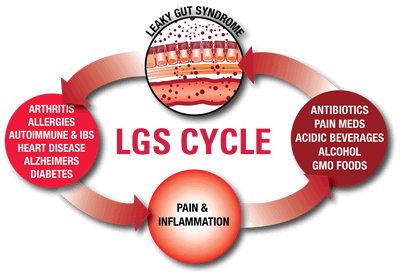What is a Leaky Gut?
What is a Leaky Gut?
Do you think that you have a leaky gut? Have you ever heard of a Leaky Gut? You won’t find leaky gut as a diagnosis in the medical school textbooks.
WebMD has this to say about Leaky Gut:
” ‘Leaky gut syndrome’ is said to have symptoms including bloating, gas,cramps, food sensitivities, and aches and pains. But it’s something of a medical mystery.
‘From an MD’s standpoint, it’s a very gray area,’ says gastroenterologist Donald Kirby, MD, director of the Center for Human Nutrition at the Cleveland Clinic. ‘Physicians don’t know enough about the gut, which is our biggest immune system organ.’
‘Leaky gut syndrome’ isn’t a diagnosis taught in medical school. Instead, ‘leaky gut really means you’ve got a diagnosis that still needs to be made,’ Kirby says. ”
For a long time, Western Medicine didn’t really even acknowledge that it exists, except in cases of Celiac or Crohn’s disease. But the number of patients with similar health complaints – the kind that used to be associated only with Crohn’s or Celiac – has been increasing exponentially.
I’m going to be sharing a few posts about Leaky Gut because it just could be the reason so many people are getting so ill these days. Look around you – are your friends getting sick seemingly more often than years ago?
What is Leaky Gut? The official short answer is intestinal hyper-permeability. A couple of pretty fancy words meaning that things are getting through the wall of the small intestine that aren’t supposed to be going through and they leak into the bloodstream!
Dr Oz explains it this way: “bacteria, viruses, undigested food particles and toxic waste products can leak from the inside of your intestines through the damaged digestive lining into your bloodstream, where they’re transported throughout your body and can trigger your immune system to react. The end result is inflammation in various parts of your body, leading to a wide variety of symptoms like bloating, cramps, fatigue, food sensitivities, flushing, achy joints, headache and rashes.”

One of the big jobs of your small intestine is to finish the digestive process by continuing to break down the food you have eaten into smaller and smaller particles. And then, it absorbs the nutrients from that food. But with Leaky Gut Syndrome, the body cannot absorb nutrients as it should due to the damaged intestines.
Another big job of your small intestine is to keep harmful stuff inside the tube, where it can’t cause too much trouble for your immune system. Harmful things like bad germs, toxins, and food particles that are still too big for your body to use.
You could say your small intestine is programmed to open the gates when the correct password is given. And only the good guys – the nutrients – have the password. But sometimes, the lining of the small intestine gets damaged. Its communication pathways can fail and the passwords get garbled. The gates can get jammed open, or even jammed shut. And that can turn into even bigger problems, what we call a leaky gut.
Stay tuned next week for What Does Leaky Gut Look Like?







That is interesting. I can not say I have ever heard of it but it makes sense.